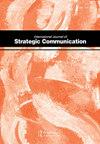A Strategic Integrated Communication Framework for Child Protection Organizations in South Africa
IF 2.3
Q1 COMMUNICATION
International Journal of Strategic Communication
Pub Date : 2022-10-20
DOI:10.1080/1553118X.2022.2093204
引用次数: 0
Abstract
ABSTRACT Child protection organizations (CPOs), as part of the non-profit sector in South Africa, play a vital role in addressing the needs of abused, neglected and vulnerable children. Child protection organizations largely depend on donors for funding, and communication plays a crucial role to ensure their sustainability. However, their communication is restricted due to statutory clauses protecting the identity and best interest of the child by limiting traditional strategies and associated fundraising practices. Niemann’s model of strategic integrated communication for the for-profit sector was taken as a point of departure. Against this background, the aim of the article was to determine how strategic integrated communication can be conceptualized and implemented to improve the communication approach and practices of child protection organizations. Focus group discussions and semi-structured interviews were conducted with four of the largest registered national child protection organizations in South Africa to determine the suitability and application of strategic integrated communication in the child protection organization context. Based on source and data triangulation, a strategic integrated communication framework, premised on Niemann’s model, is proposed. This framework not only contributes to the growing body of knowledge regarding strategic integrated communication but also contributes towards practice in the child protection organization context.南非儿童保护组织战略综合沟通框架
儿童保护组织(CPOs)作为南非非营利部门的一部分,在解决受虐待、被忽视和弱势儿童的需求方面发挥着至关重要的作用。儿童保护组织在很大程度上依赖于捐助者的资助,沟通在确保其可持续性方面起着至关重要的作用。然而,由于法律条款通过限制传统策略和相关的筹款做法来保护儿童的身份和最大利益,他们的沟通受到限制。以尼曼的赢利部门战略整合传播模型为出发点。在此背景下,本文的目的是确定如何概念化和实施战略整合传播,以改进儿童保护组织的传播方法和实践。与南非四个最大的注册国家儿童保护组织进行了焦点小组讨论和半结构化访谈,以确定战略综合宣传在儿童保护组织范围内的适宜性和适用情况。基于源和数据三角测量,提出了以尼曼模型为前提的战略集成传播框架。这一框架不仅有助于增加关于战略综合传播的知识体系,而且有助于儿童保护组织的实践。
本文章由计算机程序翻译,如有差异,请以英文原文为准。
求助全文
约1分钟内获得全文
求助全文
来源期刊

International Journal of Strategic Communication
Social Sciences-Sociology and Political Science
CiteScore
3.40
自引率
0.00%
发文量
39
期刊介绍:
The International Journal of Strategic Communication examines the philosophical, theoretical, and applied nature of strategic communication, which is “the purposeful use of communication by an organization to fulfill its mission.” IJSC provides a foundation for the study of strategic communication from diverse disciplines, including corporate and managerial communication, organizational communication, public relations, marketing communication, advertising, political and health communication, social marketing, international relations, public diplomacy, and other specialized communication areas. The IJSC is the singular forum for multidisciplinary inquiry of this nature.
 求助内容:
求助内容: 应助结果提醒方式:
应助结果提醒方式:


